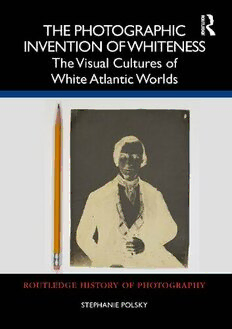
The Photographic Invention of Whiteness: The Visual Cultures of White Atlantic Worlds PDF
234 Pages·2023·8.678 MB·English
Most books are stored in the elastic cloud where traffic is expensive. For this reason, we have a limit on daily download.
Preview The Photographic Invention of Whiteness: The Visual Cultures of White Atlantic Worlds
Description:
Focusing on the creation of the concept of Whiteness, this study links early photographic imagery to the development and exploitation that were common in the colonial Atlantic World of the mid-to-late nineteenth century.With the advent of the daguerreotype in the mid-nineteenth century, White European settlers could imagine themselves as a supra-national community, where the attainment of wealth was rapidly becoming accessible through colonisation. Their dispersal throughout the colonial territories made possible the advent of a new representative type of Whiteness that eventually merged with the portrayal of modernity itself. Over time, the colonisation of the Atlantic World became synonymous with fascination itself within a European mind fixated upon both a racially subordinated world and the technical media through which it was represented. In the intervening centuries, images have acted as a medium of the imaginary, allowing for ideas around classification and the measurement of value to travel and to situate themselves as universal means. Contemporary societies still grapple with the residues of race, gender, class, and sexuality first established by the contrived mores of this representational medium, and those who were racialised by the camera as objects of fascination, curiosity, or concern have remained so well into the post-digital era.The book will be of interest to scholars working in history of photography, art history, colonialism, and critical race theory.
See more
The list of books you might like
Most books are stored in the elastic cloud where traffic is expensive. For this reason, we have a limit on daily download.
